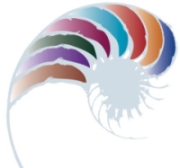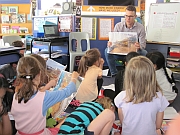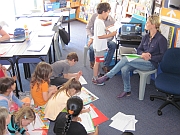
All LEARNZ field trips targeting primary and secondary schools are closely linked to the New Zealand curriculum, in particular science, social studies and geography. They can also be used by other subject teachers.
Key concepts
air traffic control, airline, airport, biosecurity, border control, business, Canterbury, Christchurch, customs, economy, environmental protection, immigration, tourism, transport
The New Zealand Curriculum - NZC
Key Competencies
LEARNZ virtual field trips contribute to the development of all five key competencies:
| Key Competencies |
Examples of Related Field Trip Components |
| Thinking |
Constructing questions to put to experts during audioconferences and via Ask-an-Expert. |
| Using language, symbols and texts |
Interpreting and making meaning of a variety of language and symbols in the background pages and throughout the web site. |
| Managing self |
Numerous content-related activities provide students with chances to engage with the material and create their own interpretation of the content. |
| Relating to others |
Videos connect students with a range of expert opinions. Students listen actively when seeking answers to video questions. |
| Participating and contributing |
LEARNZ Virtual Field Trips are an ideal medium for group-based topic inquiry. They also enable students to transfer new learning into the context of their own communities where they are encouraged to take action. |
(See page 12-13 NZC 2007)
Values
The Airport field trip encourages, models and explores these values:
- innovation, inquiry and curiosity
- diversity
- community and participation
(see page 10 NZC 2007).
E-learning and pedagogy
The Airport field trip directly involves learning that is supported by information and communication technology (ICT). In particular, the trip will:
- Assist the making of connections by enabling students to enter and explore new learning environments, overcoming barriers of distance and time.
- Facilitate shared learning by enabling students to join or create communities of learners that extend well beyond the classroom.
- Enhance opportunities to learn by offering students virtual experiences and tools that save them time, allowing them to take their learning further (Page 36 NZC 2007).
Social Science
| |
|
|
| Strand |
Achievement aims |
Background pages |
|
Social Studies

|
Place and Environment
- Level 2: Understand how places influence people and people influence places
- Level 3: Understand how people view and use places differently
- Level 4/5: Understand how people's management of resources impacts on environmental and social sustainability
|
|
Technology
| |
|
|
| Strand |
Achievement aims |
Background pages |
|
Technological Knowledge

|
Technological Systems
- Level 1: Understand that technological systems have inputs, controlled transformations, and outputs.
- Level 2: Understand that there are relationships between the inputs, controlled transformations, and outputs occurring within simple technological systems.
- Level 3: Understand that technological systems are represented by symbolic language tools and understand the role played by the “black box” in technological systems.
|
- This aspect of the curriculum will be the focus of a video related to the baggage handling system on day 1 of the field trip.
|
Mathematics
| |
|
|
| Strand |
Achievement aims |
Activities |
|
Number and algebra
Statistics

|
Statistical investigation
- Level 3: Conduct investigations using the statistical enquiry cycle:
- gathering, sorting, and displaying multivariate category and whole-number data and simple time-series data to answer questions.
|
|
English
The selected processes and strategies indicators used in the table below are from Level three of the NZC, but aim to cover indicators from levels two to four.
| |
|
|
| Strand |
Processes and strategies indicators |
Example of related field trip component |
|
Listening, Reading and Viewing

|
- selects and reads for enjoyment and personal fulfilment
- recognises connections between oral, written, and visual language
- integrates sources of information and prior knowledge confidently to make sense of increasingly varied and complex texts
- thinks critically about texts with increasing understanding and confidence
|
- printed copies of Background Pages could be part of classroom library
- making links between Audioconferences, Background Pages, and Videos
- Audioconferences, Audioconference Backchannel, Videos, Diaries, and Ask-an-Expert can be used to make sense of Background Pages and Diaries and generate questions to put to experts for further clarification
|
|
Speaking, Writing and Presenting

|
- uses an increasing understanding of the connections between oral, written, and visual language when creating texts
- creates a range of texts by integrating sources of information and processing strategies with increasing confidence
|
- making the connection between Audioconferences, Background Pages, Videos, and own discussion when generating written responses
- assimilate information from Audioconferences, Background Pages, Videos, and Ask-an-Expert to create a range of texts
|
